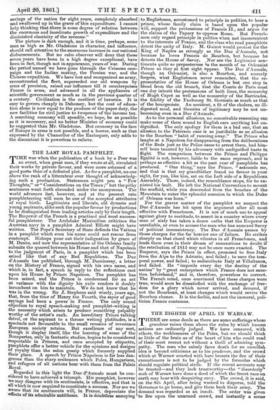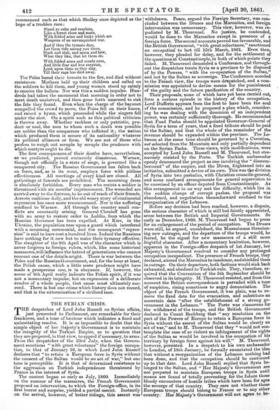THE EIGHTH OF APRIL IN WARSAW. T HERE are some deeds
as there are some sufferings whose grandeur raises them above the rules by which human actions are ordinarily judged. We have censured, with others, the recklessness of the Poles, but we should think as little of the brain as of the heart of him who could read of their most recent act without a thrill of admiring sym- pathy. The man who calmly faces death for an unselfish idea is beyond criticisms as to his prudence, and the crowd which at Warsaw courted with bare breasts the fire of their executioners is not to be judged by the formulas which should regulate political strife. If the recent accounts may be trusted—and they look trustworthy—the "disorderly" mob of Warsaw have done a deed of which the freest race on earth may hear with despairing envy. The crowd, it is said, on the 8th April, after being warned to disperse, told the Governor to go home, and give them back their army. The demand was regarded as an insult. The order was given to fire upon the unarmed crowd, and instantly a scene
Stand ye calm and resolute, Like a forest close and mate, With folded arms and looks which are Weapons of an unvanquished war.
And if then the tyrants dare, Let them ride among you there, Slash and stab, and maim and hew, What they like, that let them do.
With folded arms and steady eyes, And little fear and less surprise, Look upon them as they slay, Till their rage has died away.
The Poles bared their breasts to the fire, and died without resistance. Mothers held up their children and called on the soldiers to kill them, and young women stood up calmly to receive the bullets. Nor was this a sudden impulse. Hun- dreds had taken the sacrament that morning in order not to meet death unshrived, and then gone forth unarmed to risk the fate they found. Even when the charge of the bayonet compelled the crowd to move, the Poles fell on their knees, and raised a hymn, which proceeded while the singers fell under the shot. On a spirit such as this political criticism is thrown away. 'Whether reckless or only patriotic, pru- dent or mad, the men to whom such a death was possible are nobler than the conquerors who inflicted it; the nation which produced them is secure of its nationality whatever its political alliances or form. We are not of those who profess to weigh out scruple by scruple the prudence with which martyrs ought to die.
The first consequences of their deaths have, nevertheless, as we predicted, proved eminently disastrous. Warsaw, though not officially in a state of siege, is governed like a conquered city. The Russian Government has fallen back on force, and, as is its wont, employs force with pitiless effectiveness. All meetings of every kind are closed. All gatherings at funerals are prohibited. The mourning dress is absolutely forbidden. Every man who resists a soldier is threatened with six months' imprisonment. The wounded are carried away to the fortress, to be out of reach of their friends. Arrests continue daily, and the old weary story of continental repression has once more recommenced. Nor is the suffering confined to Warsaw. All through the country small con- flicts are constantly arising. General Chruleff has gone with an army to restore order in Lublin, from which the Russian Governor has been expelled. At Kiev, in the Ukraine, the population rose upon a guard which interfered with a mourning ceremonial, and the consequent " repres- sion" is said to have cost a hundred lives. Indeed the Russians have nothing for it now but to make their tyranny effective. The slaughter of the 8th April was of the character which is never forgiven to foreign rulers, which, like some historical massacres, will influence the hatred of generations who cannot recount one of the details aright. There is war between 'the Poles and the Russian Government, and, for the hour at least, the Polish cause, which a little more prudence might have made a prosperous one, is in abeyance. If, however, the scene of 8th April really indicate the Polish spirit, if it was not a momentary impulse, but an expression of a deliberate resolve of a whole people, that cause must ultimately suc- ceed. There is but one crime which history does not record, ,and that is the extermination of a civilized race.































 Previous page
Previous page